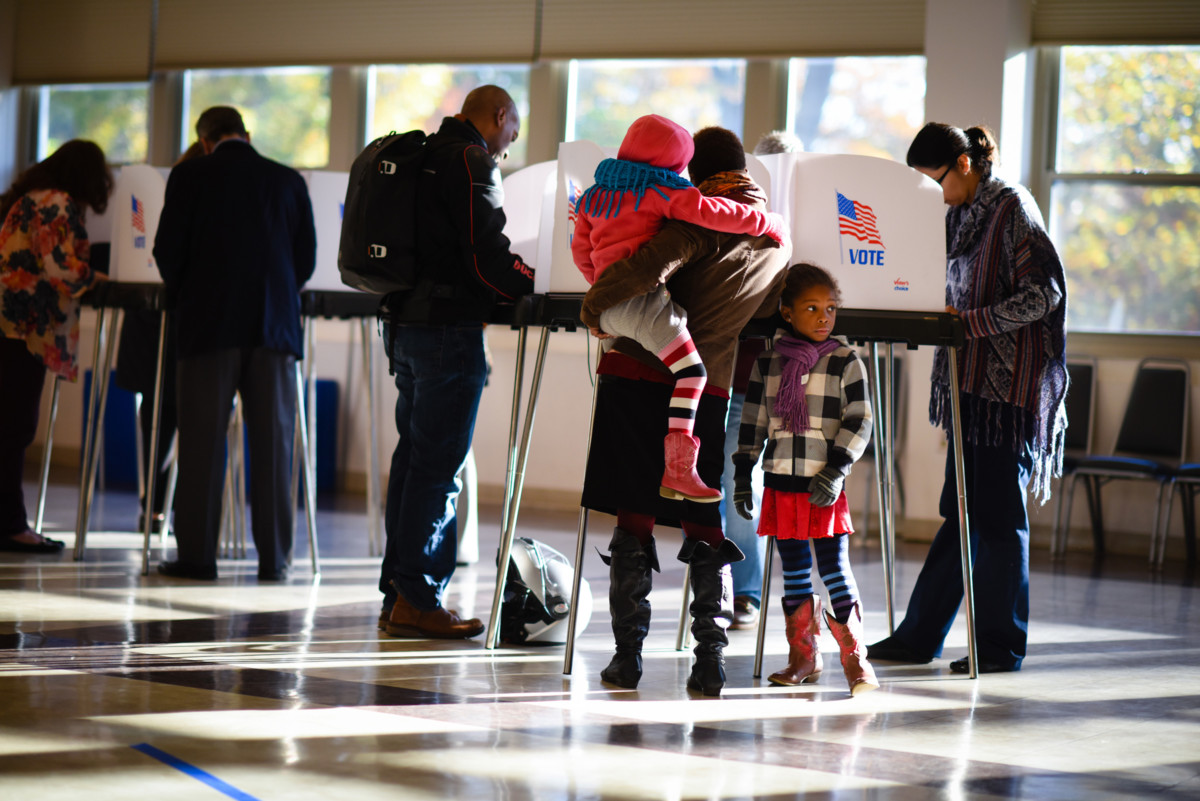Florida voters will consider a ballot initiative this November that would restore voting rights to an estimated 1.6 million people with a felony conviction — including one out of every 13 Black voters in the state. A ballot initiative in Maryland would allow people to register to vote at the polls on Election Day.
In Michigan, a sweeping ballot proposal would increase access to the ballot box and require election results to be audited, among other reforms. Another ballot initiative would hand the state legislature’s power to redraw voting districts over to an independent commission to combat partisan gerrymandering.
In the deeply red state of South Dakota, voters are considering an amendment to the state constitution that would tighten campaign finance and lobbying rules and create a government accountability board. The proposed amendment looks a lot like an anti-corruption measure that voters approved in 2016, only to have state lawmakers brazenly take it off the books last year. The latest ballot proposal would prevent lawmakers from doing so again.
Across the country, voters are considering more than two dozen ballot initiatives aimed at expanding ballot access and voting rights, as well rooting out political corruption, according to civil rights advocates and nonpartisan good government groups who held a briefing with reporters on Tuesday. Call it “draining the swamp” if you like, but these efforts are driven by activists and everyday citizens who pounded the pavement collecting signatures, not by loudmouth politicians in Washington, DC.
“We’re seeing this year an unprecedented number of democracy reforms and voting rights reforms on the ballot that could affect millions of voters … at a time when we absolutely need that,” said Dana Laurent, a director at the Ballot Initiative Strategy Center, in the briefing.
On the national stage, state-level battles over campaign finance, voting rights and redistricting are often viewed through a partisan lens. For example, state laws that create barriers to the ballot and voter registration — including voter ID laws and Florida’s law barring most felons from the ballot, which dates back to the days of Jim Crow — benefit Republicans by disenfranchising lower-income voters and voters of color who tend to vote Democrat.
Consider North Carolina, where GOP lawmakers unconstitutionally redrew voting districts along partisan and racial lines back in 2011, according to a 2016 ruling issued by a court. Republicans now enjoy a supermajority in the state legislature and have proposed two amendments to the state constitution on the November ballot that opponents characterize as a misleading and bold-faced “power grab.” One measure would reinstate voter ID requirements in a state where an ID law was struck down in federal court for targeting Black voters “with almost surgical precision.” The other would rob the state’s Democratic governor of the power to appoint judges between elections and members to state boards and commissions.
“In short, the GOP legislative majority in North Carolina appears to be trying to mislead their own constituents to push through changes that will ensure vastly fewer checks on their own power, including their power to continue changing rules to help themselves stay in office,” wrote Wendy R. Weiser and Daniel I. Weiner, two experts with the Brennan Center for Justice, in a recent analysis at Truthout.
However, Laurent said the ballot initiatives promoting positive state-level reforms this year far outnumber “regressive” initiatives like those in North Carolina. In fact, research shows that well-explained ballot measures that impact voter’s rights and day-to-day lives tend to bring people out to the polls, including voters who do not participate in every election. Eliminating political corruption and favoritism also tends to transcend partisan concerns.
For example, Colorado, Utah and Missouri – three states known to lean conservative – as well as Michigan, a swing state, are considering ballot initiatives to create independent or bipartisan state commissions to draw up voting districts, rather than allowing whatever party is in control of the state legislature to gerrymander district lines in their favor.
“This is more about power than party,” said Dan Krassner, political director of RepresentUS, a good government group promoting ballot reforms in North and South Dakota.
Krassner, a registered Republican, said both Democrats in blue states and Republicans in red states try to protect their political power with gerrymandering and ballot access. This explains why polling shows that voters on both the left and right rate corruption among their top concerns, and ballot initiatives aimed at returning power to voters are backed by coalitions of citizens from across the political spectrum. Krassner pointed to Ohio, a swing state where an overwhelming 75 percent of voters approved a 2018 ballot measure aimed at curtailing gerrymandering.
Ballot initiatives’ ability to transcend partisan politics may explain why the movement behind them is growing, despite notoriously low rates of voter turnout in the United States.
“We’re seeing a movement on the rise to fix America’s corrupt political system,” Krassner said. “The growth of this movement and the wins from this movement are like nothing we have ever seen.”
Correction: The Ohio gerrymandering ballot initiative passed in early 2018, not 2017 as this article originally stated.
Join us in defending the truth before it’s too late
The future of independent journalism is uncertain, and the consequences of losing it are too grave to ignore. To ensure Truthout remains safe, strong, and free, we need to raise $27,000 in the next 24 hours. Every dollar raised goes directly toward the costs of producing news you can trust.
Please give what you can — because by supporting us with a tax-deductible donation, you’re not just preserving a source of news, you’re helping to safeguard what’s left of our democracy.
